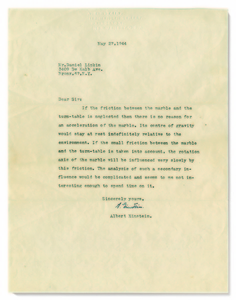EINSTEIN, Albert (1879-1955). Typed letter signed (''A. Einstein'') to Daniel Lipkin, Princeton, 27 May 1944.
EINSTEIN, Albert (1879-1955). Typed letter signed ("A. Einstein") to Daniel Lipkin, Princeton, 27 May 1944.
One page, 278 x 214mm on his embossed Mercer Street stationery with the original transmittal envelope.
Einstein responds to a physics question from a fifteen year-old high school student concerning the influence of a rotating turntable upon a marble spinning on top. Einstein writes that if friction was not taken into account, then "there is no reason for an acceleration of the marble. Its centre of gravity would stay at rest indefinitely relative to the environment." But if the friction between the surfaces was factored, then the speed of the marble's rotation "will be influenced very slowly by this friction." Einstein believed that analyzing the influence of this friction would be very complex, "and seems to me not interesting enough to spend time on it." Interestingly, the correspondent was not asking Einstein for himself, but for his classmate, Marvin Minsky (1927-2016) one of the pioneers of artificial intelligence, who originally posed the question.
View it on
Sale price
Estimate
Time, Location
Auction House
EINSTEIN, Albert (1879-1955). Typed letter signed ("A. Einstein") to Daniel Lipkin, Princeton, 27 May 1944.
One page, 278 x 214mm on his embossed Mercer Street stationery with the original transmittal envelope.
Einstein responds to a physics question from a fifteen year-old high school student concerning the influence of a rotating turntable upon a marble spinning on top. Einstein writes that if friction was not taken into account, then "there is no reason for an acceleration of the marble. Its centre of gravity would stay at rest indefinitely relative to the environment." But if the friction between the surfaces was factored, then the speed of the marble's rotation "will be influenced very slowly by this friction." Einstein believed that analyzing the influence of this friction would be very complex, "and seems to me not interesting enough to spend time on it." Interestingly, the correspondent was not asking Einstein for himself, but for his classmate, Marvin Minsky (1927-2016) one of the pioneers of artificial intelligence, who originally posed the question.



